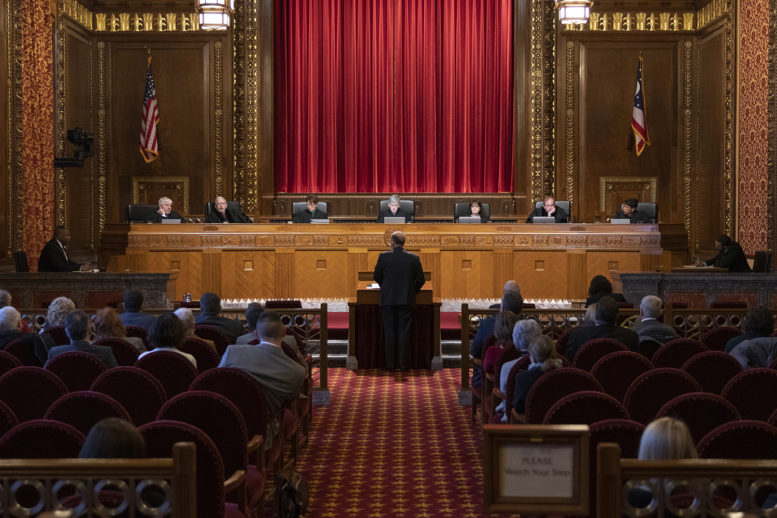Bar officials argue the ad “grossly oversimplif(ies) their opinions just to score political points.”
BY NICK EVANS
The Ohio Bar Association is urging the Republican State Leadership Committee to take down a campaign ad criticizing the three Democratic state supreme court nominees. In a letter signed by campaign advertising committee chair Paul Hervey, they argued the ad “serves to erode public trust and confidence in the judiciary.”
How we got here: DuBose
It’s another example of Republican office seekers invoking crime as a campaign issue. While the U.S. Supreme Court ruling overturning abortion rights has animated Democrats around the country, in Ohio, a very different case is energizing Republicans.
In DuBose, the Ohio Supreme Court reduced the defendant’s bail after determining the judge “unlawfully set the bail amount so high so as to ensure that DuBose could not get out.”
More generally, the court determined judges may not consider threats to public safety when setting the financial conditions of bail. Weighing public safety is perfectly fine, they ruled, for non-monetary conditions like monitoring or stay away orders. Their reasoning is rooted in Eighth Amendment protections against excessive bail.
The justices were quick to note state law already carries provisions that eliminate bail altogether for dangerous defendants — prosecutors just have to argue for it.
Republican lawmakers responded by fast-tracking an amendment — Issue 1 — for this November’s ballot. And the DuBose ruling became fodder for the RSLC’s attack ad.
“Outrageous bail rulings risk our safety,” the narrator argues, “yet Jennifer Brunner and Democrat justices on the Ohio Supreme Court ruled in favor of lowering an alleged murderer’s bail.”
The ruling in DuBose was bipartisan, though. Outgoing Republican Chief Justice Maureen O’Connor sided with the Democratic justices on the bench.
Law and order on the campaign trail
As Election Day nears, Republican candidates have increasingly leaned into a law-and-order message that blends rising crime, cash bail, and a rejection of “defund the police” rhetoric.
At a campaign stop in Delaware last week, for instance, GOP U.S. Senate nominee J.D. Vance argued, “Democrats have encouraged soft on crime policies that make it possible for violent criminals to get back on the streets. That’s why we see so many overdose deaths. That’s why we see a rise in violent crime.”
A week earlier in Columbus he argued, “In the last couple of years we’ve seen a really, really significant rise in violent crime all across the state of Ohio. I think it’s very connected to policies like letting far too many violent criminals out of prison, and importantly, cops who feel like they can’t do their job and keep us safe.”
In one campaign ad for Gov. Mike DeWine the narrator intones, “while radicals push to defund our police, Mike DeWine increased funding for law enforcement to keep us safe.” That $250 million came from the American Rescue Plan — a federal measure backed by President Biden which DeWine opposed vociferously.
The RSLC ad fits right in with the rhetorical trend. In addition to the bail reduction in DuBose, it invokes a murder case and drugs seized by police.
A closer look at crime
In reality, violent crime is up — but likely not as much as it’s perceived to be. Columbus in particular has seen a recent spike in homicides, hitting a record in 2020 only to break it in 2021. So far this year, the city has seen 118 homicides, and while that many deaths is a tragedy, it’s about fifty fewer than were reported by this time last year.
The FBI’s latest crime statistics for Ohio show modest year over year increases in the number of homicides as well as violent crime overall. At the same time, the number of agencies in Ohio actually reporting data increased by 39 between those years, too.
Nationwide, estimates suggest violent crime declined slightly from 2020 to 2021, while homicides in particular rose by 4.3%. The FBI press release notes, however, that the shift is “not statistically significant,” and that “The nonsignificant nature of the observed trends is why, despite these described changes, the overall message is that crime remained consistent.”
A closer look at the ad
In addition to criticizing Brunner’s decision on DuBose, the RSLC ad zeroes in on two additional cases to cast doubt on state appeals court judges Marilyn Zayas and Terri Jamison. For Zayas, the ad contends “she voted to dismiss the murder conviction of a man found guilty of killing in cold blood.”
Instead, Zayas was part of a majority that threw out an aggravated murder conviction and ordered a new trial for murder or felony murder. The judges determined prosecutors had failed to demonstrate the defendant acted with “prior calculation and design” as required by law.
The ad said Judge Jamison “would have thrown out evidence of drugs seized legally by police.” In that case Jamison was in the minority. Her dissenting opinion argued Columbus Police unlawfully searched a car they were impounding. Department policy directs them to inventory “the contents of all reasonably accessible areas and containers in the vehicle.” Instead, the officers searched behind an access panel in the car’s center console without first getting a warrant. One of the officers stated the panel simply fell off when he touched it. Jamison expressed skepticism noting that somehow the body cameras of both officers present failed to capture the incident.
“Ads like these perpetuate what we believe to be widespread misperceptions about the role of judges in our system of government,” Hervey said in the Bar’ Association’s letter to the RSLC
“While we are all free to disagree with a law or find fault in a judge’s legal reasoning,” he added, “it is misleading and a disservice to voters to grossly oversimplify their opinions just to score political points.”
Hervey concluded the letter by calling on them discontinue or revise the ad. While he voiced support for the organization to advocate for its chosen candidates, he urged them “to do so without using misleading terms or rhetoric that further damage public trust in the independence, integrity and impartiality of our judicial system.”
In early September, the Bar sent out a press release regarding its clean campaign pledge. The agreement commits candidates to take “personal responsibility” for the content of their ads and statements they or their backers make during the campaign.
Brunner, Zayas and Jamison all signed it. Their Republican opponents did not.
The RSLC did not respond to a request for comment. But in an emailed statement Justice Brunner said, “I commend the Ohio State Bar Association for taking a stand on this important issue.”



